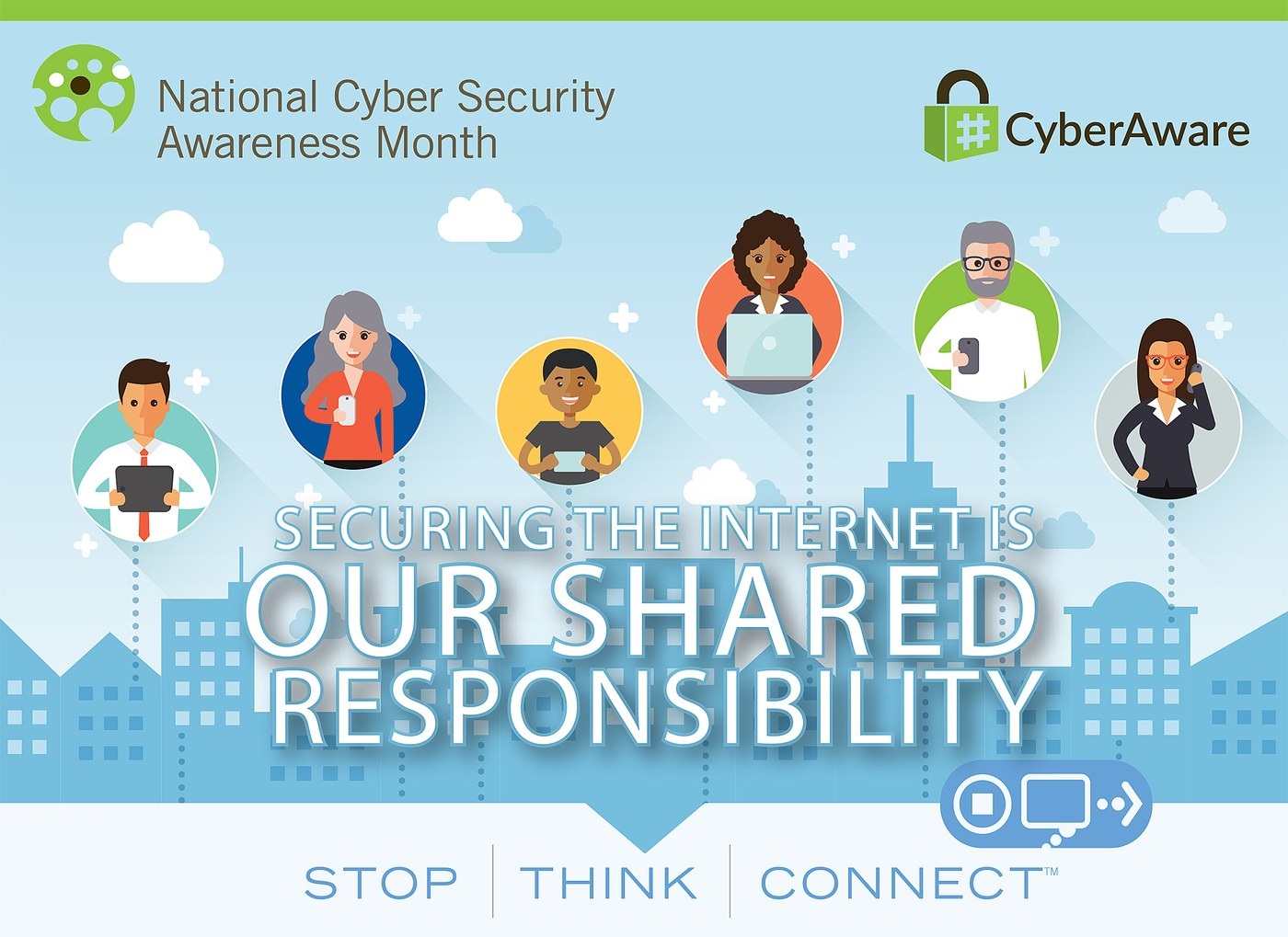October is National Cyber Security Awareness Month (NCSAM), a month to focus on preventing data breaches and protecting cyber security. The vast majority of Americans use the internet every single day, and protecting secured data is the main goal of NCSAM. During the month of October, the Department of Homeland Security (DHS) and the National Cyber Security Alliance (NCSA) have worked in a collaborative effort to issue several lessons with tips, guidelines, and best practices to make sure that you keep private information from becoming public.
NCSA’s website offers an in-depth analysis of the importance of cyber security, and what can be at an individual level to increase awareness. They also offer security advice and training for businesses of all size. Here are their top tips for keeping your information secure:
Basic Online Safety
Although NCSAM only lasts through October, every month should be treated as cyber awareness month. Share a reminder of basic online security information with your coworkers, users, or clients to keep the information fresh. Most of these tips have been said before, but then again, there are still those who will compromise security out of ignorance.
Password Management
Have you used the same password since high school? Do you use the same password for everything, no matter how secure the information? It’s time to get a password manager and change your old passwords. Changing your passwords may seem daunting (what if you forget what you chose?) but it doesn’t have to be a pain: password managers securely store all of your passwords so you don’t have to remember them. For example, the LastPass Chrome extension acts as a vault where all your login details are stored and secured with one master password, which allows you to easily log into multiple accounts.
Auto-Lock Devices
One stolen phone is all it takes to destroy your bank account, credit cards, and sensitive emails. Make sure you keep your phone locked with a number code or, better yet, your thumbprint. As a general rule, all devices should be securely locked when they are unattended. This practice is especially important when in public, as unattended devices are a target for scammers.
Beware of Suspicious Emails
Do people still receive phishing emails? Absolutely! Phishing scams, or scams that appear to be a normal, everyday email but contain a virus, are getting trickier to spot. Is that really a random email from your aunt? To be safe, be cautious when clicking on email attachments.
Back Up Data
We can’t stress enough how important it is to back up your data on a regular basis. We’re pretty confident in saying that every single person that has lost files due to a crash has regretted not backing up data. It’s easier than ever to automatically back up data; schedule cloud backups with file hosting services like Dropbox and Carbonite. Add in a hard drive that is capable of scheduling automatic syncing, and you’ll be covered in case of emergency.
We also recommend setting your computer to automatically update applications and programs, including your anti-virus. Keeping up-to-date on the latest versions increases compatibility and decreases the chances of becoming infected by an old bug.
Infected External Drives
Be aware that a virus is capable of infecting a computer through a flash drive, a hard drive, or even a smartphone.
Social Media Privacy
If you have your social media information public and readily available, you are informing potential criminals where you work, what your address is, and when you’re on vacation. This allows your home to be vulnerable to being robbed, including your electronics. Again, make sure that your devices are locked whenever you are away, just in case.
Monitor Accounts
Catching a fraud early enough can prevent damage from being done. Many banks have account alerts that allow you to receive messages for spending limits, suspicious activity, travel alerts, and more. Monitoring your bank accounts is the easiest way to know if there has been a breach of security.
Public vs. Private Computers
To protect yourself against identity theft, make sure that you never access important financial information on a public computer.Tax information, bank accounts, and medical records, should only be accessed through your private computer. This includes public places like libraries, as well as places that offer free WiFi, as many WiFi networks are not secure.
Dynadot, a domain name registrar and web hosting provider, states: “If you have a website, you should consider adding an SSL certificate to secure it sooner rather than later. If your website does any kind of e-commerce or allows customers to create an account, then you definitely need to add an SSL certificate to your website. This will keep your customers’ information secure and allow them to trust your website. SSL certificates are a cheap and easy way to ensure your website’s – and your customers’ – security.”
Workplace Security Measures
Keep your client, employee, and business information safe by creating policies that support safe cyber security. Require all of your employees to have a secure password that contains numbers, letters, and symbols and that is longer than 10 characters long. Strong passwords are the easiest, yet least practiced, form of cyber security.
Monitor cyber attacks that are going on, like the Equifax breach. Learning the hard lessons from other’s cyber security mistakes can help keep you cyber aware, as well as up-to-date with latest industry news and developments.
Make sure that you use cloud-based services so that your information isn’t being held in any one place. Stick with reputable companies and make sure that your server is secure by installing the appropriate firewalls.
Cyber security training is a must. Implement a section of cyber security to new employees, or uptrain current employees on the latest best practices. Remember, cyber security is all about education and prevention!
Stop. Think. Connect.
Stop. Think. Connect. is a global cyber security education and awareness campaign aimed at increasing the public’s understanding of Internet responsibility and safety, focusing “on cyber threats and empowering the American public to be safer and more secure online.” Not only do they promote cyber security awareness, but they also address other online issues, such as bullying and promoting positivity.
Implementing these basic security measures can help prevent you, your employees, and your business from cyber attacks and threats.
President and founder of DVI, Aaron Boerger realized early in life that he had a unique combination of x-ray vision and business acumen for seeing the weaknesses that held businesses back – and the ability to define the right tools, technology and strategy to make them stronger.
From founding a successful technology support business in his early teens, to serving as Chief Operating Officer for several companies in the financial, technology and marketing industries, Aaron has developed a reputation for reinventing technology implementation tactics – and the willingness to tell people not what they want to hear, but what they need to hear, in order to achieve success without overwhelm.
Aaron will always go the extra mile to provide the accountability and support his clients need to achieve their goals, yet isn’t afraid to tell them when they are doing something wrong.

